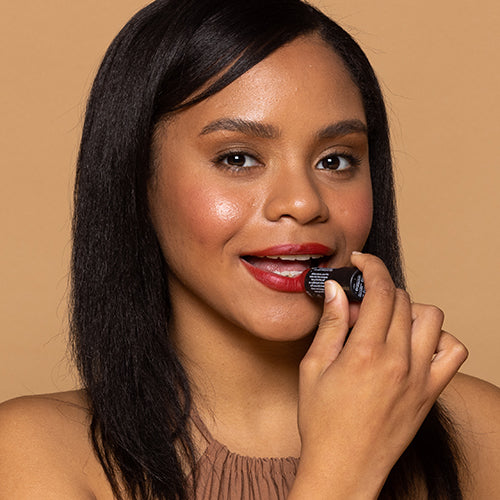Since 2014 I had been exploring ideas on plastic-free reusable metal tins and glass jars, but none of them were quite perfect until I found the perfect cardboard tubes in 2021.
Cardboard tubes were my favourite option, as, in my experience, very few people ever reuse packaging – which meant tins were out. And there is a heavy carbon footprint associated with returning packaging to the vendor and of course, recycling of many materials (like glass), simply doesn’t happen. As a result, compostable packaging still wins in my book, particularly for products like lip balms.
For 6 years I had been testing different cardboard tubes. I was often misled by suppliers whose tubes looked great and lasted well, but were in fact lined with a plastic inner. I struggled to find tubes which actually lasted on shelf (which is obviously a critical issue for retailing) and most importantly, a lot of the tubes I tested weren’t easy to use for the consumer. At the end of the day, all the eco credentials in the world are useless if customers end up not liking the product as they won’t commit to a planet-friendly swap.

But finally, in early 2020, we landed on some fabulous, cardboard tubes which ticked all the boxes, which we launched on Earth Day 2021.
Packaging aside, I wanted these balms to do good for the planet and people.
Being environmentally friendly and socially responsible should go hand in hand. You cannot be a sustainable brand if the work you do does not consider people in the communities who produce your ingredients, those who create your product and – of course – the end users.
For me, a critical element of our lip launch was the opportunity to work directly with more producers, as an extension of our direct trade program. Currently we work directly with our producer in Samoa to source organic, fairly traded coconut oil and with a cooperative in Ghana to source delicious cocoa butter, free from child labour. Both of those would, of course, make an appearance. For the final flourish, I looked a little further afield for a delicious oil, that was scientifically proven to do good things for skin, but which also made a difference for the people who produced it.

I landed on Moringa oil from a farming cooperative in Rwanda.
Moringa oil comes from the Moringa tree, which is a tough, drought tolerant plant that flourishes where food crops do not. Growing the crop and producing Moringa oil created an income for farmers who were struggling to grow and sell food crops. It ensures a higher, more reliable income compared to typical cash crops like tea and coffee, as they simply will not grow in the local conditions. Our cooperative works with local farmers to not only trade the oil at a fair price (higher than market), but also provides agricultural training and conducts research to find any new crops which can be added to the farmers repertoire. Working directly with cooperatives ensures they are paid a fair price and that that money stays in the community, not with a middleman.
Lip balms are an easy product to make, but tricky to nail a really good formula. I have made what feels like scores of them over the years; I have taught Girl Guides how to make lip balms, I’ve taken some classes for customers who wanted to make their own custom balms and years and years ago as a kid, I sold them at school markets.
So, the final piece of the formulation puzzle was to ensure the balms were brilliant. I want you all to love them. I had to ensure the balms were soft but firm, highly hydrating and nourishing, delicious smelling and glided on smoothly when applied. I think the combination of cocoa butter, coconut oil, moringa oil, jojoba oil and candelilla wax do just that. Paired with delicious combinations of essential oils like peppermint and pink grapefruit, they will become your favourite pocket essential.
Our balms do good for people, do good for the planet and do good for your lips.




